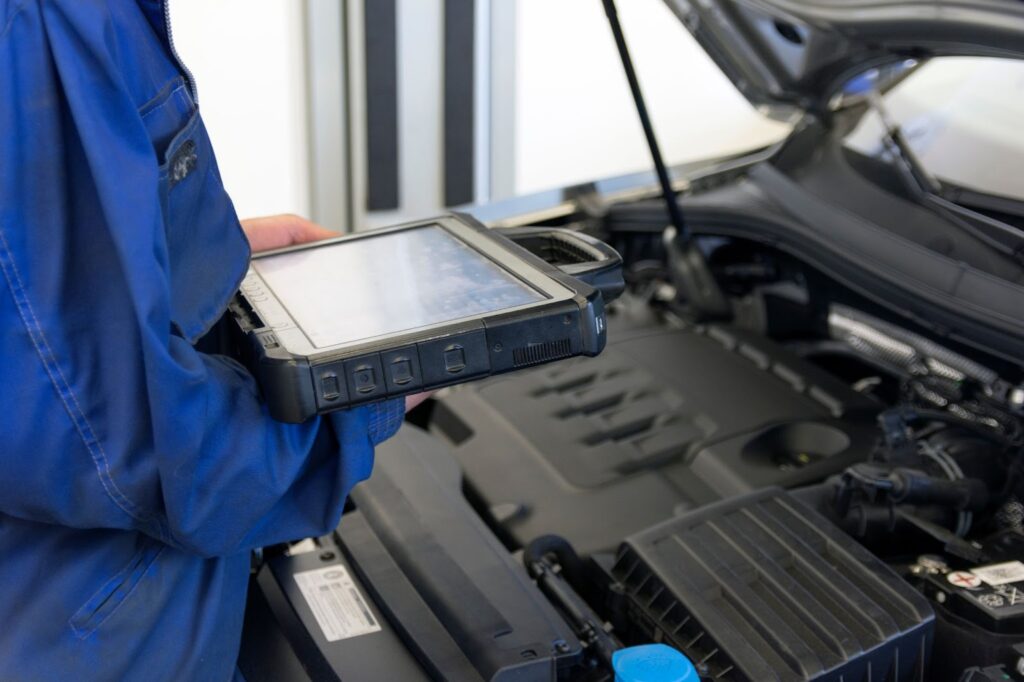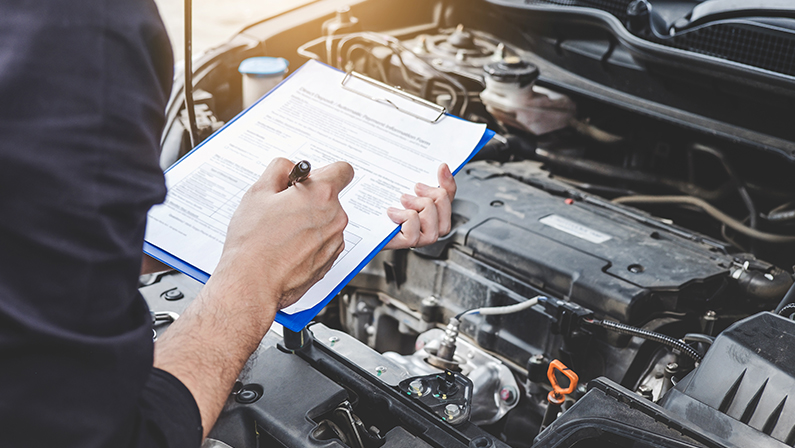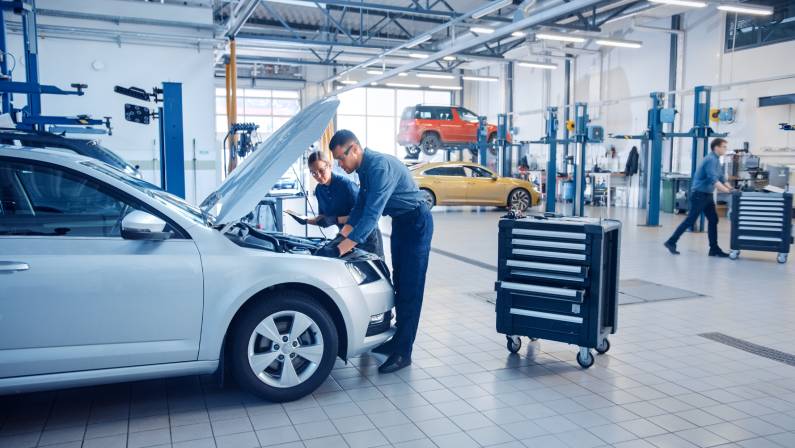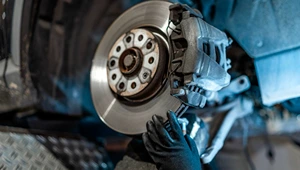
When your dashboard lights up with warning signals, or you start having trouble with your lights, power windows, or battery, it’s probably time for an electrical diagnostic. Knowing what’s involved in this process—and how much it might cost—can help you avoid any unwelcome surprises.
Car electrical systems are a web of car wiring, sensors, and computers, making them tricky to troubleshoot without the right tools and expertise.
In this guide, we’ll walk you through what affects the cost of a car electrical diagnostic, how it works, and how to find reliable, budget-friendly service options.
What Is a Car Electrical Diagnostic Test?
A car electrical diagnostic test is a comprehensive evaluation of your vehicle’s electrical components to identify any underlying issues. This test involves connecting specialized diagnostic tools to your car’s computer system, which reads error codes and assesses the health of essential systems like the battery, alternator, sensors, and wiring. Technicians use these results to pinpoint faults accurately, helping you address potential problems before they escalate.
What is Included in a Car Diagnostic Test?
A car diagnostic test covers multiple systems to ensure your vehicle runs efficiently and safely.
Here’s what’s typically included:
- Engine Performance Analysis: This part of the test examines the engine control unit (ECU) to detect issues affecting performance, such as misfires, fuel efficiency, or air-to-fuel ratio problems. Technicians use these insights to determine if repairs or adjustments are needed.
- Battery and Alternator Check: The battery and alternator are tested to assess their charge levels and overall health. A weak battery or faulty alternator can lead to power loss and impact the entire electrical system.
- Sensor Evaluation: Sensors in your car provide crucial information for systems like fuel management and emissions control. This part of the diagnostic ensures sensors are functioning correctly, as faulty sensors can trigger warning lights or impact fuel efficiency.
Why Do You Need an Electrical Diagnostic for Your Car?
Regular electrical diagnostics are essential to keep your vehicle running safely and reliably.
Here’s why you should consider this service:
- Early Issue Detection: A diagnostic test can catch minor electrical issues before they develop into costly repairs. Identifying these problems early helps you avoid breakdowns and ensures your car runs smoothly.
- Enhanced Safety: Electrical issues can affect critical systems like lighting, braking, and power steering. Ensuring these systems are functioning well enhances safety for you and other drivers on the road.
- Improved Performance and Efficiency: An optimized electrical system contributes to better overall vehicle performance and fuel efficiency. When issues are detected and fixed, your car can run at its best without straining other components.
How Much Does a Car Electrical Diagnostic Typically Cost?
The cost of a car electrical diagnostic test varies depending on the complexity of the issue and the service provider. Onaverage, the diagnostic fee ranges from $80 to $150, but this can increase if in-depth testing or additional services are needed. To get an accurate estimate for your vehicle, contact us at Status Automotive & Collision in Houston, TX. We are your best choice for vehicle electrical repair around and near Houston, and our experienced technicians can provide you with a detailed assessment and competitive pricing. Talk to our experts and get a quote today if you need a service provider for your car’s electrical diagnostics.

What Affects the Cost of Car Electrical Diagnostics?
The cost of car electrical diagnostics can vary widely based on several factors. From the type of vehicle you drive to the level of expertise and technology available at the shop, each element can influence how much you’ll pay for a diagnostic. Understanding these factors can help you make informed decisions when choosing a service provider and anticipating expenses.
Here are some key factors that impact the cost of diagnosing electrical issues in your car:
Type of Vehicle (Luxury vs. Standard)
The make and model of your vehicle play a significant role in diagnostic costs. Luxury or high-performance vehicles often have more advanced and intricate electrical systems that require specialized equipment and expertise, which can lead to higher diagnostic fees. In contrast, diagnostics for standard vehicles are usually simpler and less costly due to the relative simplicity of their electrical components.
Diagnostic Equipment and Technology Used
Different shops use various types of diagnostic equipment, and the technology available can affect pricing. High-end diagnostic tools capable of detailed scanning and pinpointing issues accurately often come at a premium. Shops with more advanced technology may charge a bit more for diagnostics, but these tools can also lead to faster, more precise identification of electrical problems, potentially saving on repair costs in the long run.
Labor Rates at Different Shops or Regions
Labor rates vary based on location and the specific shop. For instance, shops in urban areas or highly specialized auto repair centers often have higher labor rates than those in smaller towns or general repair shops. Regional cost differences can also play a role, as some areas have a higher cost of living, which affects shop pricing. Comparing local rates can help you find a service that fits your budget without sacrificing quality.
Severity or Rarity of the Electrical Issue
The complexity and rarity of the electrical issue can also influence diagnostic costs. Minor issues like a faulty sensor may take less time to diagnose, leading to lower costs. However, complex or unusual electrical problems, especially those requiring extensive troubleshooting or expertise, can increase the diagnostic fee. In some cases, the need for advanced skills and longer diagnostic sessions may raise the overall expense.
Each of these factors contributes to the overall cost of car electrical diagnostics, so consider them when budgeting for this essential service.

How long does a car diagnostic test take?
The duration of a car diagnostic test at car electrical repair shops varies depending on the complexity of the issue, but most tests take between 30 minutes and an hour. For straightforward diagnostics, such as identifying common issues or checking error codes, the process may be quick.
However, if the problem requires in-depth analysis or further troubleshooting, it may take longer. Additionally, complex electrical issues may require multiple tests or more detailed scans, extending the time required.
Should You Go to a Dealership or an Independent Mechanic for Diagnostics?
Choosing between a dealership and an independent mechanic for diagnostics depends on your vehicle and your preferences. Dealerships often have specialized diagnostic equipment and brand-specific expertise, making them ideal for complex or warranty-related issues, especially in newer or luxury vehicles. On the other hand, independent mechanics can offer more affordable rates and are often well-equipped for standard diagnostics, making them a great choice for budget-conscious owners with common vehicle makes and models.
Is It Worth Paying for a Car Electrical Diagnostic Test?
Yes, paying for a car electrical diagnostic test is typically worthwhile, as it can help prevent more costly repairs down the line. Identifying electrical issues early ensures your car remains safe and reliable, and a diagnostic test provides valuable insights that can extend the lifespan of critical components. Additionally, a professional diagnostic test saves time and frustration by pinpointing the exact cause of a problem, helping you avoid unnecessary part replacements or repairs.
How Often Should You Get a Car Electrical Diagnostics Check?
A car electrical diagnostic check is recommended whenever you notice unusual warning lights or erratic electrical behavior or after purchasing a used car. Regular diagnostics every 1-2 years can also be beneficial, especially for older vehicles prone to electrical issues. Preventive diagnostics allow you to catch minor problems before they become major issues, helping you maintain your car’s performance and avoid unexpected breakdowns.

Choose the Best Auto Shop in Houston for Reliable Diagnostics
When it comes to maintaining your car’s electrical system, a thorough diagnostic test can make all the difference in identifying and addressing issues early. For drivers seeking top-quality diagnostics and exceptional service, Status Automotive & Collision stands out as the best auto shop in Houston.
With experienced auto electrical specialist, advanced diagnostic tools, and a commitment to honest and efficient service, Status Automotive & Collision in Houston, TX, ensures your vehicle is in capable hands. Contact us today to schedule your diagnostic test and keep your car running at its best only at the best auto electrical repair in Houston.




